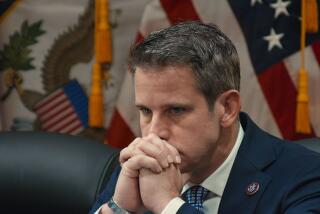Review: Henry Kissinger’s ‘World Order’ is a timely warning
- Share via
The wall-builders are winning.
In an age in which advances in technology, communications and transportation have dramatically shrunk the distance between cultures and countries, in a nation that became a global superpower by assuming a leadership role economically, diplomatically and militarily over most of the last century, isolationist forces at the extremes of both of our major political parties are pulling the United States away from its traditional role on the world stage.
Conservative Republicans and liberal Democrats are equally complicit in this withdrawal. One party builds walls to prevent the flow of people by obstructing immigration reform. The other constructs barriers to prevent the flow of goods and capital by blocking free trade. The impact of this hyper-polarization has been thoroughly documented in terms of U.S. domestic policy, as hard-line partisans on both sides trade insults and epithets while the nation’s economic, education and energy needs remain mired in gridlock.
But the stultifying effect on U.S. foreign policy is of similar consequence, which makes this a critical time for the reemergence of former Secretary of State Henry Kissinger, one of the most visible and influential advocates for American internationalism for the better part of the last half-century.
Kissinger uses his 21st book, “World Order,” to warn of the dangers of isolationism and ethnocentrism as obstacles to peaceful coexistence between nations with divergent priorities and argues for the heightened need for American leadership in an increasingly interconnected world.
“No country has played such a decisive role in shaping contemporary world order as the United States,” he writes, “nor professed such ambivalence about participating in it.”
Leading the reader through centuries of European, Russian, Asian and Middle Eastern cultural, social and psychological development, Kissinger explains how those experiences affect leaders’ behavior on a contemporary world stage. He notes that our country’s unwillingness to recognize those differences has inevitably led to military and diplomatic catastrophes and warns that similar consequences are likely without a greater effort on the part of our political leaders to recognize that Western approaches are not universal.
He describes the European concept of conflict resolution, dating to the mid-1600s, designed to encourage balance and compromise between warring countries so that rivals could coexist under a system of international norms and collective oversight. But “World Order” reaches even further into history to demonstrate how geographic, religious and cultural influences elsewhere make achieving post-conflict equilibrium much lower priorities in Islamic, Russian and Chinese tradition.
Since our competitors and adversaries have fundamentally different goals than those we have inherited through Western and European convention, he argues, expecting them to adhere to our prescribed approach toward reconciliation is doomed to fail.
While Kissinger’s geopolitical analysis of our global challenges is compelling, it becomes increasingly clear throughout the book that his recommendations will be a tough sell to the tea partiers and Occupy-ers who dominate our current political landscape. (Of course, Kissinger’s specialty is international relations, not domestic politics. Perhaps David Axelrod and Karl Rove can take on that challenge in their next books.)
America’s current isolationist tendencies are nothing new: Kissinger discusses the nation’s inward focus after both World Wars, Korea and Vietnam and explains how periodic U.S. withdrawal from international engagement created vacuums that opportunistic aggressors sought to exploit. Inevitably, our country was drawn into more military conflicts created by the geopolitical power imbalance our absence had created. His argument resonates especially strongly at a moment when the U.S. struggles with decisions about the potential need for further military involvement on the same patch of Middle Eastern earth from which our troops departed so recently.
It is entirely understandable that a war-fatigued populace — in any era — wants nothing more than a well-deserved rest at the conclusion of prolonged conflict. But even as Kissinger acknowledges that temptation, he repeatedly stresses the danger that arises in the absence of an American counterweight to aggression from other corners of the planet.
“The quest for that balance… between the poles of overconfidence and introspection, is unending,” he writes. “What it does not permit is withdrawal.”
Mark Twain, who was known more for his sense of humor than his diplomatic skills, once said, “History does not repeat itself. But it rhymes.” Kissinger’s advice is not nearly as glib, but much more valuable to a country that right now seems to want the rest of the world to just go away.
Schnur is the director of the Jesse M. Unruh Institute of Politics at USC.
World Order
Henry Kissinger
Penguin Press: 420 pp., $36
More to Read
Sign up for our Book Club newsletter
Get the latest news, events and more from the Los Angeles Times Book Club, and help us get L.A. reading and talking.
You may occasionally receive promotional content from the Los Angeles Times.










